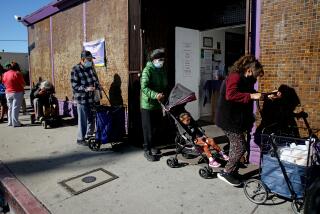900 Observe World AIDS Day in L.A.
- Share via
About 900 people participated Friday in World Aids Day events designed to break down the social and economic barriers that have helped spread the disease in Los Angeles’ homeless and minority communities.
Poetry, gospel music and stand-up comedy helped attract an estimated 400 to a gathering at skid row’s San Julian Park during the morning, but the entertainment soon gave way to the work of fighting one of the world’s most serious health problems.
Visitors were given free HIV tests and condoms, and counseling was provided by workers from nearly 20 social service agencies.
“How many partners have you had in the last 12 months?” Christine Garcia, an outreach coordinator for the Los Angeles Mission, asked Denise, a 49-year-old homeless woman.
“Three,” Denise said, clasping her wiry hands in her lap.
Garcia then gave Denise an “OraSure” HIV test, which uses a cotton swab held in the mouth for four minutes. The results will be available in a week.
But Garcia, who has given HIV tests to homeless people on skid row for three years, knew Denise might not return for her results. Most don’t.
But the social worker said the event brought important resources to some of the people who need it most. Of the approximately 11,000 homeless people living on skid row, an estimated 3% to 4% have tested positive for HIV.
Later Friday, about 200 local residents attended an AIDS Day event in Lincoln Heights. Participants walked with lighted candles from a Mass at Sacred Heart Catholic Church to nearby Lincoln Park, where a priest blessed the site of a memorial wall to be built next year for Latinos who have died of AIDS.
Along with African Americans, Latinos continue to be disproportionately struck by the disease, despite advances in drug therapies and improved services overall, health officials said.
Experts say minority communities often tend to view AIDS as a stigma instead of an illness that can be avoided or treated.
“I used to say my son died of a heart attack,” Ernestina Montellano said of her eldest son. “I was so ashamed to say he died of AIDS.”
Dr. Eric Bing, who helped coordinate an AIDS event attended by more than 300 on Friday at the UCLA King-Drew Medical Center in Watts, urged a change in attitudes.
“People need to speak up in their communities, in their families and in their churches,” he said. “One person can make a difference.”
But “Sam,” a 34-year-old Latino, said he’s still worried about who finds out about his illness.
“I’ve lost jobs because of it,” he said. “Even if there is a cure in the next five years, I think the prejudice will be around for decades.”
More to Read
Sign up for Essential California
The most important California stories and recommendations in your inbox every morning.
You may occasionally receive promotional content from the Los Angeles Times.













